|
1858 newspaper Republican ABRAHAM LINCOLN LOSES the ELECTION for US Senator from Illinois to Democrat STEPHEN A DOUGLAS - inv # 1Q-139
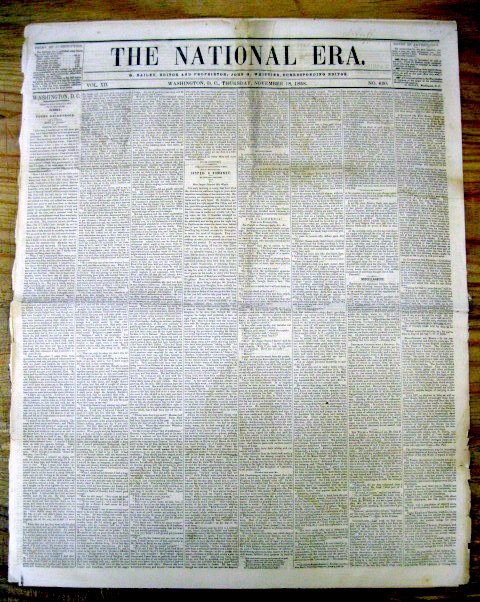 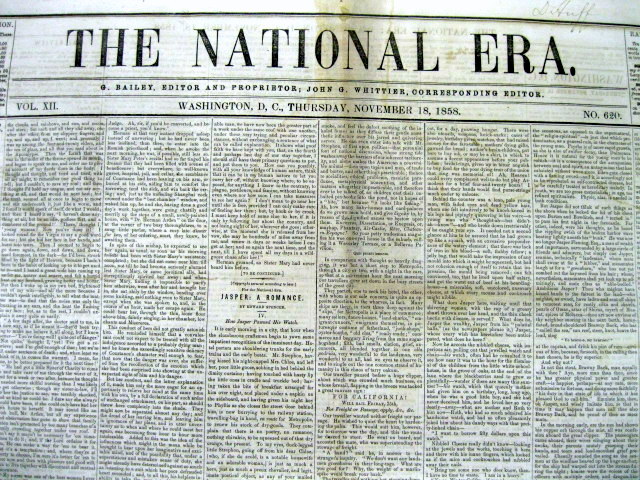 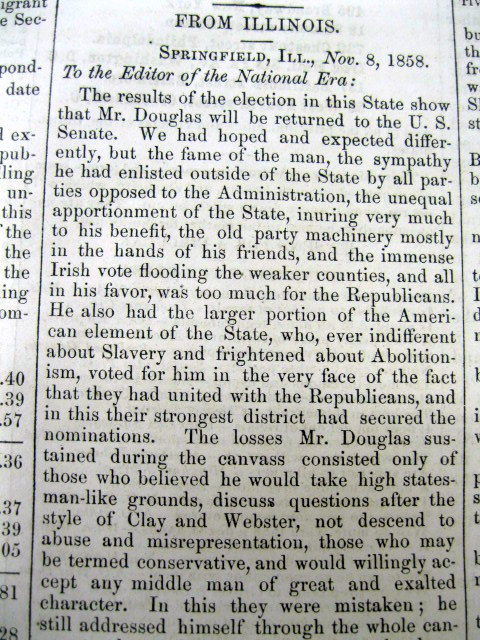 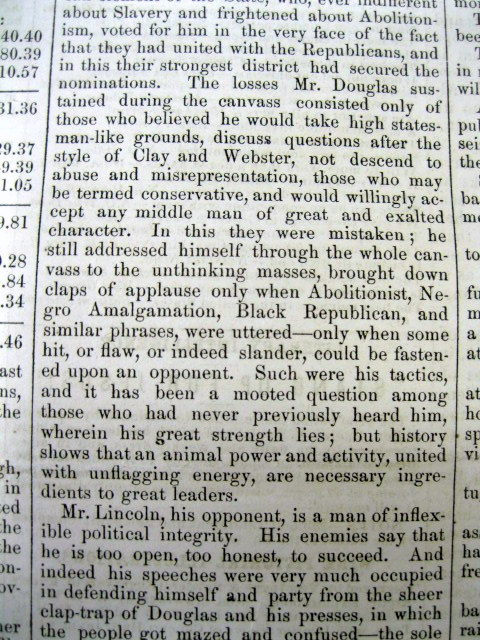 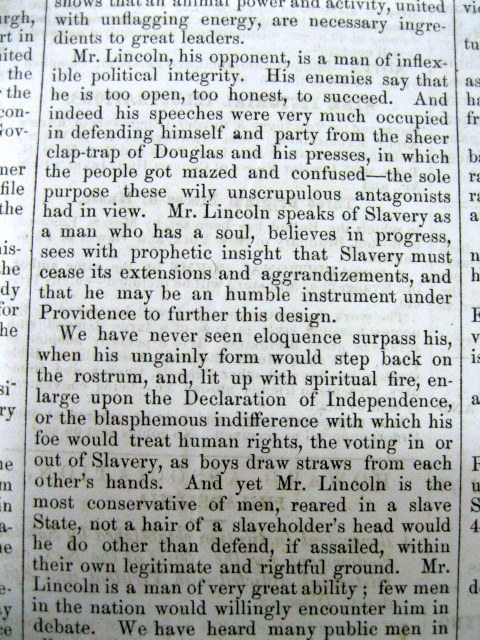 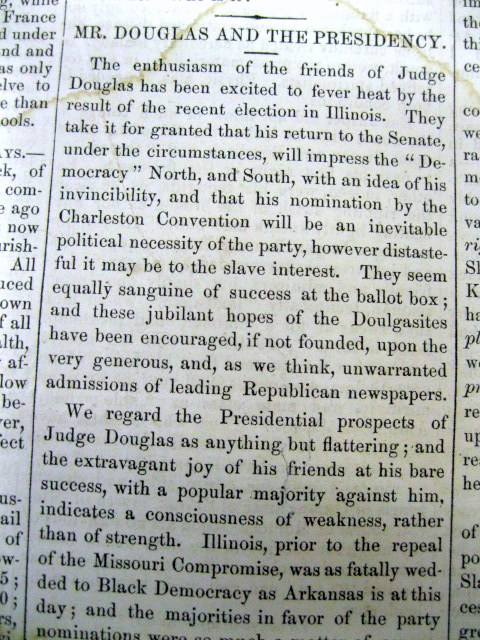 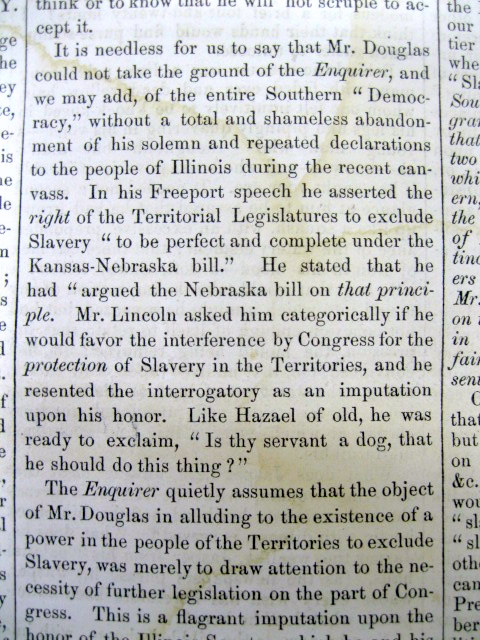
Please visit our EBAY STORE at the link directly below for HUNDREDS of HISTORICAL NEWSPAPERS on sale or at auction:
http://stores.ebay.com/Steve-Goldman-HISTORICAL-NEWSPAPERS_W0QQsspagenameZL2222QQtZkm
SEE PHOTO----- COMPLETE, ORIGINAL NEWSPAPER, the National Era (Washington, DC) dated Nov 18, 1858. This newspaper contains inside page long detailed reports (on pages 2 and 3) of the Election in Illinois for the US Senate seat from Illinois. Democrat Stephen A Douglas defeated Republican Abraham Lincoln; however, Lincoln garnered huge National publicity from his series of Lincoln-Douglas Debates. This publicity is what thrust Lincoln into the National spotlight and propelled him to the Presidency in 1860.
On election day, the Democrats won 40 seats in the state house of Representatives, and the Republicans won 35. In the state senate, Republicans held 11 seats, and Democrats held 14. Stephen A. Douglas was reelected by the legislature, 54-46, even though Abraham Lincoln won the popular vote with a percentage of 50.6%, or by 3,402 votes.
Stephen Douglas was first elected to the United States Senate in 1846. In 1858, he was seeking re-election for a third term. During his time in the Senate, the issue of slavery was raised several times, particularly with respect to the Compromise of 1850. As chairman of the committee on territories, Douglas argued for an approach to slavery termed popular sovereignty; electorates at a local level would vote whether to adopt or reject a state constitution which prohibited slavery. Decisions about whether slavery was permitted or prohibited within certain states and territories had been made previously at a federal level. Douglas was successful with passage of the Kansas–Nebraska Act in 1854. Abraham Lincoln, like Douglas, had also been elected to Congress in 1846. He served one two-year term in the House of Representatives. During his time in the House, Lincoln disagreed with Douglas and supported the Wilmot Proviso, which sought to ban slavery in new territory. Lincoln returned to politics in the 1850s to oppose the Kansas–Nebraska Act, and help develop the new Republican party.
Before the debates, Lincoln said that Douglas was encouraging his fears of amalgamation of the races with enough success to drive thousands of people away from the Republican Party. Douglas tried to convince, especially the Democrats, that Lincoln was an abolitionist for saying that the American Declaration of Independence did apply to blacks as well as whites. Lincoln called a self-evident truth "the electric cord ... that links the hearts of patriotic and liberty-loving men together", of different ethnic backgrounds.
Lincoln argued in his House Divided Speech that Douglas was part of a conspiracy to nationalize slavery. Lincoln said that ending the Missouri Compromise ban on slavery in Kansas and Nebraska was the first step in this direction, and that the Dred Scott decision was another step in the direction of spreading slavery into Northern territories. Lincoln expressed the fear that the next Dred Scott decision would make Illinois a slave state.
Both Lincoln and Douglas had opposition. Although Lincoln was a former Whig, the prominent former Whig Judge Theophilus Lyle Dickey said that Lincoln was too closely tied to the abolitionists, and supported Douglas. But Democratic President James Buchanan opposed Douglas for defeating the Lecompton Constitution, and set up a rival National Democratic party that drew votes away from him.
On election day, the Democrats won 40 seats in the state house of Representatives, and the Republicans won 35. In the state senate, Republicans held 11 seats, and Democrats held 14. Stephen A. Douglas was reelected by the legislature, 54-46, even though Abraham Lincoln won the popular vote with a percentage of 50.6%, or by 3,402 votes. However, the widespread media coverage of the debates greatly raised Lincoln's national profile, making him a viable candidate for nomination as the Republican candidate in the upcoming 1860 presidential election. He would go on to secure both the nomination and the presidency, beating Douglas (as the Northern Democratic candidate), among others, in the process.
The Lincoln–Douglas Debates of 1858 (also known as The Great Debates of 1858) were a series of seven debates between Abraham Lincoln, the Republican candidate for the United States Senate from Illinois, and incumbent Senator Stephen Douglas, the Democratic Party candidate. At the time, U.S. senators were elected by state legislatures; thus Lincoln and Douglas were trying for their respective parties to win control of the Illinois legislature. The debates previewed the issues that Lincoln would face in the aftermath of his victory in the 1860 presidential election. Although Illinois was a free state, the main issue discussed in all seven debates was slavery in the United States.
In agreeing to the official debates, Lincoln and Douglas decided to hold one debate in each of the nine congressional districts in Illinois. Because both had already spoken in two—Springfield and Chicago—within a day of each other, they decided that their "joint appearances" would be held only in the remaining seven districts.
The debates were held in seven towns in the state of Illinois:
The debates in Freeport, Quincy and Alton drew especially large numbers of people from neighboring states, as the issue of slavery was of monumental importance to citizens across the nation. Newspaper coverage of the debates was intense. Major papers from Chicago sent stenographers to create complete texts of each debate, which newspapers across the United States reprinted in full, with some partisan edits. Newspapers that supported Douglas edited his speeches to remove any errors made by the stenographers and to correct grammatical errors, while they left Lincoln's speeches in the rough form in which they had been transcribed. In the same way, pro-Lincoln papers edited Lincoln's speeches, but left the Douglas texts as reported.
After losing the election for Senator in Illinois, Lincoln edited the texts of all the debates and had them published in a book. The widespread coverage of the original debates and the subsequent popularity of the book led eventually to Lincoln's nomination for President of the United States by the 1860 Republican National Convention in Chicago.
The format for each debate was: one candidate spoke for 60 minutes, then the other candidate spoke for 90 minutes, and then the first candidate was allowed a 30-minute "rejoinder." The candidates alternated speaking first. As the incumbent, Douglas spoke first in four of the debates.
Good condition. This listing includes the complete entire original newspaper, NOT just a clipping or a page of it. STEPHEN A. GOLDMAN HISTORICAL NEWSPAPERS stands behind all of the items that we sell with a no questions asked, money back guarantee. Every item we sell is an original newspaper printed on the date indicated at the beginning of its description. U.S. buyers pay priority mail postage which includes waterproof plastic and a heavy cardboard flat to protect your purchase from damage in the mail. International postage is quoted when we are informed as to where the package is to be sent. We do combine postage (to reduce postage costs) for multiple purchases sent in the same package. We accept payment by PAYPAL as well as by CREDIT CARD (Visa and Master Card). We list hundreds of rare newspapers with dates from 1570 through 2004 on Ebay each week and we ship packages twice a week. This is truly SIX CENTURIES OF HISTORY that YOU CAN OWN!
Please check out our constantly updated offerings by doing a seller search by clicking on the address below:
http://cgi6.ebay.com/ws/eBayISAPI.dll?MfcISAPICommand=ViewListedItems&since=2&userid=qrst&include=0&rows=200
Please visit our EBAY STORE at:
http://stores.ebay.com/Steve-Goldman-HISTORICAL-NEWSPAPERS_W0QQsspagenameZL2222QQtZkm
Stephen A. Goldman Historical Newspapers has been in the business of buying and selling historical newspapers for over 40 years. Dr. Goldman is a consultant to the Freedom Forum Newseum and a member of the American Antiquarian Society. You can buy with confidence from us, knowing that we stand behind all of our historical items with a 100% money back guarantee. Let our 40+ years of experience work for YOU ! We have hundreds of thousands of historical newspapers (and their very early precursers) for sale. | 














